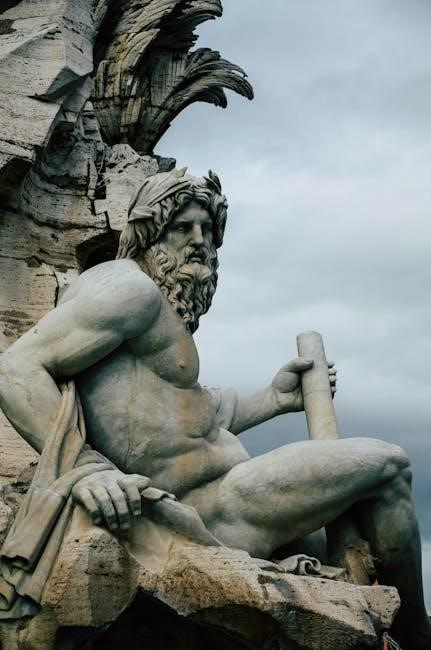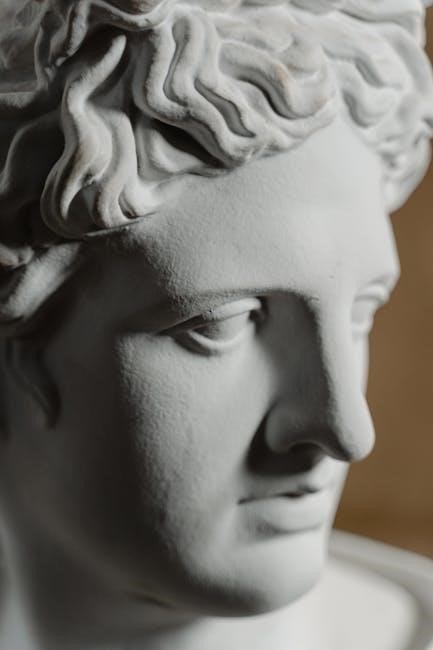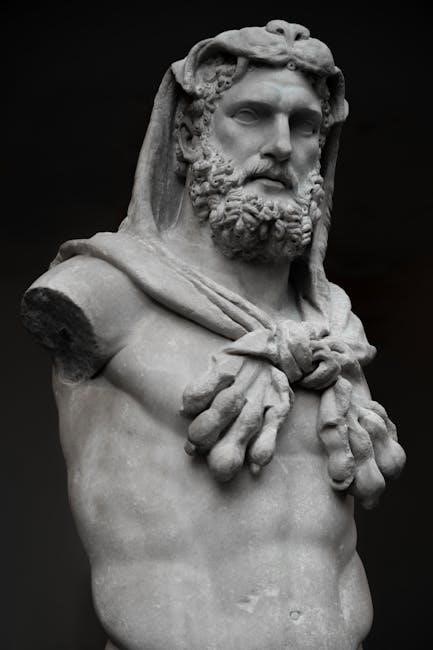Percy Jackson’s Greek Gods offers a captivating guide to Greek mythology, blending humor with educational insights. It serves as both an entertaining tale and a valuable resource for young readers and mythology enthusiasts alike, perfectly complementing the Percy Jackson series.
1.1 Overview of the Book and Its Significance
Percy Jackson’s Greek Gods is a witty, modern retelling of Greek mythology, narrated by Percy Jackson. The book simplifies complex myths, making them accessible to young readers while maintaining their timeless appeal. Its significance lies in blending humor with education, offering a fresh perspective on classic tales and enhancing the Percy Jackson universe. It serves as both entertainment and a learning tool for mythology enthusiasts of all ages.
1.2 Rick Riordan’s Unique Approach to Mythology
Rick Riordan breathes new life into Greek mythology through Percy Jackson’s voice, blending humor with ancient tales; His approach simplifies complex myths, making them relatable and engaging for modern readers. By focusing on themes like power and hubris, Riordan highlights timeless lessons while keeping the stories fresh. His unique storytelling style bridges the gap between ancient and contemporary, appealing to both young audiences and mythology enthusiasts.
The Creation Myth and the Rise of the Titans
The book explores Gaea’s creation of the primordial gods and the Titans, detailing their rise and eventual downfall. Percy’s narrative highlights their significance in Greek mythology.
2.1 The Birth of Gaea and the Primordial Gods
Gaea, the Earth, emerges as the first deity, birthing Uranus, Pontus, and the Titans. Percy humorously recounts Gaea’s role in shaping the cosmos, emphasizing her as the foundation of Greek mythology. The primordial gods’ origins are vividly described, setting the stage for the intricate world of divine beings and their eternal struggles for power.
2.2 The Overthrow of Ouranos and the Reign of Kronos
Gaea conspires with her children to overthrow Uranus, leading to Kronos’ brutal ascension. Percy’s narration vividly captures the chaos and brutality of this power struggle. Kronos’ tyrannical rule and fear of prophecy drive the storyline, highlighting themes of power, fate, and the cyclical nature of divine governance in Greek mythology.

The Olympian Gods and Their Stories
Percy Jackson’s Greek Gods vividly explores the lives and personalities of the Olympian deities, from Zeus’ authority to Hera’s complex nature, blending humor with insightful storytelling.
3.1 Zeus and His Rule
In Percy Jackson’s Greek Gods, Zeus is portrayed as a powerful yet flawed ruler, known for his thunderbolt and unpredictable temper. Percy humorously highlights Zeus’ infidelity and his role in maintaining order, while also exploring his complexities as a leader. This chapter provides a modern twist on Zeus’ reign, blending myth with relatable insights.
3.2 Poseidon, Hades, and the Division of the World
Percy Jackson’s account of Poseidon, Hades, and the division of the world offers a lively retelling of how the three brothers became rulers of the sea, underworld, and sky. With his witty commentary, Percy explores their distinct personalities and the challenges of their realms, providing a fresh perspective on their roles in Greek mythology.
3.3 The Stories of Hera, Demeter, and Other Olympian Deities
Percy Jackson’s Greek Gods vividly portrays Hera, Demeter, and other Olympian deities, highlighting their complex roles and stories. With characteristic humor, Percy delves into Hera’s protective yet vengeful nature, Demeter’s maternal devotion, and the intriguing tales of other gods, offering readers a compelling mix of drama and insight into their divine lives and influences.

Themes and Moral Lessons in the Book
Percy Jackson’s Greek Gods explores themes of power dynamics, fate, and hubris, offering moral lessons through Percy’s witty retelling of ancient myths, emphasizing humility and consequences.
4.1 The Concept of Power and Status
Percy Jackson’s Greek Gods delves into the intricate dynamics of power, showcasing how divine status shapes relationships and decisions. Percy’s narrative highlights the consequences of power struggles, from the Olympians’ rise to the Titans’ downfall. The book explores how power influences both gods and mortals, emphasizing hierarchy and control, while also touching on gender roles and societal expectations within the mythological world.
4.2 Fate, Hubris, and the Consequences of Actions
Percy Jackson’s Greek Gods examines the role of fate and hubris, illustrating how even gods face consequences for their actions. Stories of Zeus, Poseidon, and Hades reveal the inevitability of fate, while hubris often leads to downfall. Percy’s modern retelling emphasizes how these themes remain timeless, offering lessons on humility and responsibility, making ancient myths relatable to contemporary audiences.

Percy Jackson’s Narrative Style
Percy Jackson’s narrative style in Greek Gods is witty and engaging, blending humor with insightful retellings of ancient myths. His modern voice makes the stories relatable and fun.
5.1 Humor and Modern Retelling of Ancient Myths
Percy Jackson’s Greek Gods infuses ancient myths with humor and modern flair. Percy’s witty commentary and sarcastic asides breathe fresh life into timeless stories, making them relatable and entertaining for contemporary readers. His engaging narrative style transforms complex myths into amusing tales, blending comedy with educational value while maintaining the essence of Greek mythology.

5.2 Percy’s Personal Insights and Biases
Percy’s narration is filled with personal insights and biases, offering a unique perspective on Greek mythology. He openly shares his opinions on the gods, expressing admiration for some and disdain for others. His humorous remarks and candid judgments make the stories more engaging, while his biases add a relatable, human touch to the divine tales.

Cultural and Historical Context
Percy Jackson’s Greek Gods bridges ancient mythology with modern culture, offering a fresh perspective on timeless tales. It connects historical myths to contemporary audiences, making them relatable and engaging.
6.1 The Influence of Greek Mythology on Modern Literature
Greek mythology’s timeless themes and characters have profoundly shaped modern literature. Rick Riordan’s Percy Jackson’s Greek Gods reimagines these ancient stories, blending humor with tradition. By modernizing myths, the book inspires new adaptations and interpretations, showcasing mythology’s enduring relevance. Its success highlights how classical tales continue to influence contemporary writing, appealing to both young readers and scholars alike with fresh perspectives.
6.2 Bridging the Gap Between Ancient and Contemporary Audiences
Percy Jackson’s Greek Gods seamlessly connects ancient myths with modern sensibilities. By narrating classic tales through Percy’s witty voice, Riordan makes mythology accessible to today’s readers. The book’s relatable humor and contemporary language bridge the gap, engaging young audiences while staying true to the original stories. This approach fosters a deeper appreciation for mythology among new generations, ensuring its relevance in the modern world.
Critical Reception and Fan Reviews
Percy Jackson’s Greek Gods has received widespread acclaim for its engaging storytelling and humor; Fans praise its modern twist on ancient myths, making it both entertaining and educational.
7.1 Praise for the Book’s Entertainment and Educational Value
Percy Jackson’s Greek Gods has been celebrated for its unique blend of humor and education. Readers commend its ability to make ancient myths accessible and engaging. The book’s modern retelling, narrated by Percy, has been praised for its entertainment value while also providing insightful lessons on Greek mythology, making it a favorite among both young readers and enthusiasts.
7.2 Comparisons to Other Works by Rick Riordan
Percy Jackson’s Greek Gods stands out among Riordan’s works for its unique narrative style. While maintaining the humor and adventure of the Percy Jackson and the Olympians series, this book delves deeper into mythology. Fans often compare it to Riordan’s other mythological explorations, noting its fresh perspective and ability to complement the original series while offering something distinctly new and engaging.
The Book’s Place in the Percy Jackson Series
Percy Jackson’s Greek Gods serves as a companion to the main series, offering background stories and enhancing the universe’s depth. It bridges gaps and enriches the narrative.
8.1 Connections to the Percy Jackson and the Olympians Series
Percy Jackson’s Greek Gods seamlessly connects to the main series by providing the mythological backdrop that shapes Percy’s adventures. It fills in gaps about the Olympians, Titans, and primordial gods, offering context to key events and characters from the original books. Percy’s witty narration bridges the gap between ancient myths and modern demigod experiences, enriching the series’ universe for fans.
8.2 How Greek Gods Enhances the Overall Universe
Percy Jackson’s Greek Gods enriches the series by offering a fresh, humorous retelling of classic myths. It provides depth to the world-building, exploring the origins and flaws of gods, which adds layers to Percy’s adventures. This companion book not only educates but also entertains, making it a vital piece that connects mythology to the modern demigod experiences, enhancing the overall Percy Jackson universe.

Educational Value and Target Audience
Percy Jackson’s Greek Gods serves as an engaging educational tool, blending mythology with modern humor. It appeals to young readers and mythology enthusiasts, making ancient stories accessible and entertaining while fostering a deeper understanding of Greek myths.
9.1 Suitability for Young Readers and Mythology Enthusiasts
Percy Jackson’s Greek Gods is ideal for young readers, offering an engaging and humorous take on Greek mythology. Its modern twist makes ancient stories relatable and entertaining for both children and enthusiasts. The book’s accessible language and Percy’s witty narration ensure it appeals to a wide audience, fostering a love for mythology while providing educational value. It is suitable for ages 10 and above, blending fun with insightful storytelling.
9.2 The Book as a Tool for Learning Greek Mythology
Percy Jackson’s Greek Gods serves as an excellent resource for learning Greek mythology. It provides a comprehensive overview of the creation myths, Titans, and Olympian gods, presented in an engaging, modern style. Percy’s humorous and relatable narration simplifies complex stories, making them accessible to readers of all ages. The book is both entertaining and informative, offering insights into the cultural and historical significance of Greek myths while maintaining educational value for enthusiasts and newcomers alike.
Percy Jackson’s Greek Gods leaves a lasting impact as a modern, engaging retelling of Greek mythology, inspiring new adaptations and maintaining its appeal as both entertainment and an educational resource.
10.1 The Impact of Percy Jackson’s Greek Gods on Pop Culture
Percy Jackson’s Greek Gods has revitalized interest in Greek mythology, making it accessible and entertaining for modern audiences. Its unique blend of humor and education has influenced literature, inspiring new adaptations and fostering a deeper appreciation for classical myths among younger generations, solidifying its place in popular culture as a beloved and enduring resource.
10.2 The Enduring Appeal of the Book
Percy Jackson’s Greek Gods remains a timeless favorite, captivating readers with its witty retelling of ancient myths. Its unique voice, blending humor with insightful storytelling, resonates across generations. The book’s ability to make mythology relatable and entertaining ensures its lasting popularity, solidifying its place as a cherished read within the Percy Jackson universe and beyond. Its appeal continues to grow, inspiring new fans and adaptations alike.